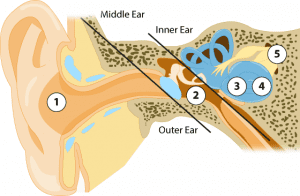 Hearing & Balance Services of Reston is excited to announce our partnership with the American Institute of Balance (AIB), located in Largo, FL. AIB is one of the country’s best-known diagnostic, treatment and educational facilities specializing in equilibrium disorders. The Institute is widely recognized for providing practitioners with the most current clinical and scientific breakthroughs in treatments. We are proud to announce that AIB has qualified us as a Center of Specialty Care!
Hearing & Balance Services of Reston is excited to announce our partnership with the American Institute of Balance (AIB), located in Largo, FL. AIB is one of the country’s best-known diagnostic, treatment and educational facilities specializing in equilibrium disorders. The Institute is widely recognized for providing practitioners with the most current clinical and scientific breakthroughs in treatments. We are proud to announce that AIB has qualified us as a Center of Specialty Care!
Understanding Dizziness, Vertigo & Imbalance

Did you know…
- According to the National Institute of Health (NIH), dizziness or loss of balance will affect 90 million Americans sometime during their lifetime.
- Dizziness is the number one complaint reported to medical providers in adults 70 years of age or older.
- Balance-related falls account for more than one-half of accidental deaths in the elderly.
- Balance-related falls cause over 300,000 hip fractures in individuals over 65 years of age.
- Inner ear disorders or ear infections can result in imbalance and vertigo affecting a person’s ability to walk, roll over in bed, see or think clearly, or to read or watch television.
- Many times, disorders of the inner ear are misdiagnosed as a more severe neurological condition such as multiple sclerosis, or as clinical depression.
Inner ear disturbances account for 85% of dizzy disorders. - Children can also be affected by inner ear disorders and are sometimes incorrectly diagnosed as learning disabled, dyslexic, or psychologically disturbed.
- Illness, infections, disease, head injuries and whiplash are frequent causes of imbalance, dizziness, and vertigo.
Balance and the Vestibular System
The medical term for the part of the inner ear involved with balance is called the vestibular system. The vestibular system is an organ located within the inner ear which relays information to the brain about balance and orientation of the head and body. Balance is a complex interaction which requires input from our vestibular system, in addition to our vision and the sensation from our feet, muscles, and joints. If any one of these systems are not working properly, you will suffer loss of balance.
Balance Disorders
Balance disorders fall into two main categories:
- The first is dizziness, vertigo, or motion intolerance. This condition may be caused or worsened by rapid head movement, turning too quickly, walking, or riding in a car. These symptoms can be acute or sharp attacks lasting for seconds or sometimes for several hours.
- The second is a persistent sense of imbalance or unsteadiness. Some people refer to this as a loss of surefootedness. There can be many causes of dizziness and imbalance, with the largest percentage coming from the vestibular system.
A balance disorder may be caused by viral or bacterial infections in the ear, a head injury, or blood circulation disorders that affect the inner ear or brain. Many people experience problems with their sense of balance as they get older. Balance problems and dizziness also can result from taking certain medications. However, many balance disorders can begin all of a sudden and with no obvious cause. Your physician may have referred you to our clinic as the balance experts who will help in the process of determining possible causes and best treatment options.
Neurodiagnostic Testing
The inner ear is home to the hearing and balance centers. The receptors within the ear allow signals to be received and processed by a variety of locations within the central nervous system and the brain. Unlike imaging studies which show only the anatomy or structures, this family of tests allows your doctor to better understand how the system is working and where a problem may arise.
Depending on your condition, your physician may recommend evaluation of the hearing and/or balance centers as they are all part of the inner ear. All testing is easy, comfortable and uses advanced technology.
